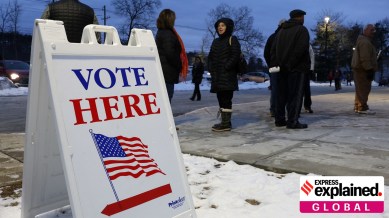US Presidential elections 2024: What is the New Hampshire primary — and why is it significant?
For the Republican side, New Hampshire has been a good predictor of who wins the GOP nomination. The state has correctly predicted the party nominee every year except 2000 in the millennium. On the Democratic side, that's only been true 50% of the time.

Voters in New Hampshire are heading to the polls on Tuesday (January 23) for the country’s first presidential primary election. Under the spotlight is Republican presidential contender Nikki Haley, who is hoping to narrow former President Donald Trump’s delegate lead after his thumping victory in the Iowa caucuses last week.
For Democrats, this year’s New Hampshire primary doesn’t mean much. President Joe Biden isn’t even on the ballot. This is because Democrats have changed their primary calendar, moving their first votes to different states.
Here is everything you need to know about the New Hampshire primary election and why it is significant.
What is the difference between caucuses and primaries?
Caucuses and primaries are the processes available to the 50 American states (plus Washington DC and outlying territories) to choose the two major parties’ nominees for President. The contests — referred to as the primary race — are being held this year between January 15 and June 8.
Since the Democrats all but have their nominee already — President Biden — the 2024 primary race holds significance only for the Republican party. Republican presidential candidate Donald Trump is far ahead of other Republican candidates, though.
Some American states hold primaries, some hold caucuses, and a third group holds a combination of the two systems. Primary elections are conducted by governments; caucuses are private events held by the parties.
In primaries, voters go to polling stations and check the box against the name of their favoured candidate. Caucuses are lengthier processes in which voters attend meetings at public places such as school gymnasiums, churches, and community centres, debate candidate preferences and, when it comes to voting, openly raise their hands for their choice.
The caucus system favours candidates with strong, active bases over those with broader support — and is often criticised for being vulnerable to intimidation, and inconvenient for employees who work in shifts and parents who might find it difficult to attend an in-person meeting of unpredictable length.
Why does New Hampshire go first?
New Hampshire has conducted the first presidential primary election since 1920, when 16,195 Republicans and 7,103 Democrats turned out on March 9. In 1975, the state passed a law that mandated that the election must take place at least a week before any other state’s primary.
In the 1980s, New Hampshire struck a deal with Iowa, allowing Iowa to hold the first caucus and New Hampshire the first primary.
According to a report by The New York Times, conducting the first primary has several benefits, including an influx of out-of-state cash and media attention.
Who is on the ballot?
Let’s first see the Republicans. There are only two candidates left in the presidential race, including Trump and Haley. The latest contender to drop out of the race is Florida Governor Ron DeSantis, who made the announcement after Trump registered a big win in the Iowa caucuses. While Trump received 51% of votes, DeSantis got 21.2% of them. Haley managed to garner 19.1% of votes and stood in third position.
In New Hampshire, although polls show that Haley is closing the gap on Trump, the former president is still quite ahead of her. According to the latest Monmouth University-Washington Post poll, released on Monday (January 22), Trump leads Haley by 18 points, 52% to 34%, with DeSantis at 8% — the poll was conducted before DeSantis dropped out of the race.
Now, the Democrats. As mentioned before, President Biden isn’t on the ballot for the New Hampshire primary. But why? Last year, the Democrats changed their primary calendar to bring states with a more racially diverse make-up than Iowa and New Hampshire, which are overwhelmingly white. As a result, the first two states to vote for a Democratic presidential nominee will be South Carolina and Nevada (both of them hold primaries instead of caucuses), which will vote on February 3 and February 6 respectively.
However, New Hampshire refused to cede its first-in-the-nation primary status and scheduled an unsanctioned primary for Tuesday. Therefore, President Biden’s name will not appear on the New Hampshire primary ballot.
Why is the New Hampshire primary important?
According to a report by CBS News, New Hampshire primary results often make or break a candidate’s presidential campaign. Dante Scala, a professor of political science at the University of New Hampshire, told the news outlet: “It’s the donors, like the people giving money, who want to see success immediately in the first few contests… So that’s why, for a lot of candidates, it’s Iowa or bust, or it’s New Hampshire or bust.”
Moreover, for the Republican side, it has been a good predictor of who wins the GOP nomination. New Hampshire has correctly predicted the party nominee every year except 2000 in the millennium. On the Democratic side, that’s only been true 50% of the time.